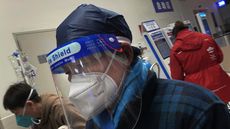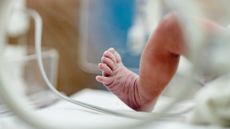Anastrozole: the daily breast cancer pill tipped to save thousands of lives
Existing treatment approved for preventative use under 'pioneering' NHS drug repurposing scheme

Nearly 300,000 women in England will be offered a preventative pill to help them avoid breast cancer.
The drug, anastrozole, has been available for years as a breast cancer treatment, and had already been recommended for prevention by the UK's health cost regulator. But it has become the first drug to be licensed for a new use under the "pioneering" multi-agency Medicines Repurposing Programme set up in 2021, said NHS England.
Breast cancer is the most common cancer in England, with about 50,000 people diagnosed each year. While survival rates have improved, it still claims about 11,500 lives each year. For post-menopausal, at-risk women, the off-patent drug can nearly halve the chance of developing the disease if taken every day for five years.
Subscribe to The Week
Escape your echo chamber. Get the facts behind the news, plus analysis from multiple perspectives.

Sign up for The Week's Free Newsletters
From our morning news briefing to a weekly Good News Newsletter, get the best of The Week delivered directly to your inbox.
From our morning news briefing to a weekly Good News Newsletter, get the best of The Week delivered directly to your inbox.
NHS chief executive Amanda Pritchard called the news "a new era for cancer prevention". The pills, which cost only 4p a day, would follow statins in having a "transformative", life-saving impact, she wrote for The Telegraph.
What is anastrozole and how does it work?
Anastrozole is a type of hormone treatment that lowers the level of oestrogen in the body. According to NHS England, the medication is an "aromatase inhibitor", which cuts down the amount of oestrogen a body makes by blocking the "aromatase" enzyme.
Common side-effects mirror those of menopause, such as hot flushes and sweating, vaginal dryness or bleeding, tiredness and low mood. Patients usually take a small tablet every day for up to five years.
Anastrozole has been used for many years to treat breast cancer, and its power to prevent the disease has been shown in key trials for years. It was first backed for use as a preventative option by the National Institute for Health and Care Excellence (Nice) in 2017, after scientists found that the protective effects lasted for years after women stopped taking the medication.
However, widespread prescribing was "stymied", said The Telegraph's health editor Laura Donnelly, because the drug was only licensed for treatment, not prevention, of breast cancer. The off-patent drug could only be prescribed "off-label" – "severely limiting take-up".
Why has it become available for prevention now?
Anastrozole has been relicensed via a "repurposing" programme, which aims to get drugs licensed for one treatment approved for another if found to be effective. The programme, set up in 2021, is hosted by NHS England and supported by Nice, the Medicines and Healthcare products Regulatory Agency (MHRA) and other agencies.
It "builds on work done during the pandemic", said Donnelly, when arthritis drugs and steroids were "repurposed" as Covid treatments. Under the programme, the MHRA "licensed the new purpose" for anastrozole, after pharmaceutical company Accord Healthcare "agreed to apply for the licence on a not-for-profit basis".
The move to make anastrozole available to eligible women "represents a potential new frontier in the fight against Britain's big killers", said The Guardian's health policy editor Denis Campbell.
NHS boss Pritchard said the programme could "help us realise the full potential of existing medicines in new uses to save and improve more lives".
The move "adds to the NHS's armoury of preventative breast cancer medication", said Sky News, with tamoxifen and raloxifene already licensed to prevent the disease.
If even 25% of eligible women take anastrozole, about 2,000 cases of breast cancer a year could be prevented in England, saving the NHS £15 million in treatment.
It is a "major step forward", said Baroness Delyth Morgan, chief executive at charity Breast Cancer Now.
Who is eligible?
Women who have a moderate or high risk of breast cancer are eligible for the medication. For example, a woman whose "first-degree relative (mother, daughter or sister) was diagnosed with breast cancer before the age of 40 is likely to be considered for it", explained Donnelly.
Those with two such relatives getting breast cancer – at any age – "could also be considered", as would those with "a mix of first and second-degree relatives (such as an aunt, grandparent or niece)".
"Approaches to help prevent breast cancer at high risk are badly needed," Dr David Crosby, head of prevention and early detection at Cancer Research UK, told The Guardian. This is "a welcome announcement".

Continue reading for free
We hope you're enjoying The Week's refreshingly open-minded journalism.
Subscribed to The Week? Register your account with the same email as your subscription.
Sign up to our 10 Things You Need to Know Today newsletter
A free daily digest of the biggest news stories of the day - and the best features from our website
Harriet Marsden is a writer for The Week, mostly covering UK and global news and politics. Before joining the site, she was a freelance journalist for seven years, specialising in social affairs, gender equality and culture. She worked for The Guardian, The Times and The Independent, and regularly contributed articles to The Sunday Times, The Telegraph, The New Statesman, Tortoise Media and Metro, as well as appearing on BBC Radio London, Times Radio and “Woman’s Hour”. She has a master’s in international journalism from City University, London, and was awarded the "journalist-at-large" fellowship by the Local Trust charity in 2021.
-
 Today's political cartoons - December 2, 2023
Today's political cartoons - December 2, 2023Cartoons Saturday's cartoons - governors go Gotham, A.I. goes to the office party, and more
By The Week US Published
-
 10 things you need to know today: December 2, 2023
10 things you need to know today: December 2, 2023Daily Briefing Death toll climbs in Gaza as airstrikes intensify, George Santos expelled from the House of Representatives, and more
By Justin Klawans, The Week US Published
-
 5 hilarious cartoons about the George Santos expulsion vote
5 hilarious cartoons about the George Santos expulsion voteCartoons Artists take on Santa versus Santos, his X account, and more
By The Week US Published
-
 4 tips for protecting your skin during winter
4 tips for protecting your skin during winterThe explainer The temperature drop could make anyone susceptible to dryer skin. Time to switch up your skin care routine.
By Theara Coleman, The Week US Published
-
 US life expectancy rose in 2022 but not to pre-pandemic levels
US life expectancy rose in 2022 but not to pre-pandemic levelsSpeed Read Life expectancy is slowly crawling back up
By Devika Rao, The Week US Published
-
 China's pneumonia cases: should we be worried?
China's pneumonia cases: should we be worried?The Explainer Experts warn against pushing 'pandemic panic button' following outbreak of respiratory illness
By Keumars Afifi-Sabet, The Week UK Published
-
 How polysubstance abuse is worsening the American opioid crisis
How polysubstance abuse is worsening the American opioid crisisThe Explainer Studies are showing that more Americans are struggling with dependency on multiple substances.
By Theara Coleman, The Week US Published
-
 Kush: the drug destroying young lives in West Africa
Kush: the drug destroying young lives in West AfricaThe Explainer There has been a sharp rise in young addicts in Sierra Leone, Guinea and Liberia
By Flora Neville, The Week UK Published
-
 Why infant mortality is rising
Why infant mortality is risingThe Explainer The infant mortality rate recently rose for the first time in two decades
By Devika Rao, The Week US Published
-
 5 tips for dealing with grief during the holiday season
5 tips for dealing with grief during the holiday seasonThe Explainer Finding your holiday cheer might be more complicated when you're grieving. But it's not impossible.
By Theara Coleman, The Week US Published
-
 Ageing boomers: America’s looming crisis
Ageing boomers: America’s looming crisisUnder the radar A person turning 65 today in US has an almost 70% chance of needing long-term care
By The Week Staff Published










